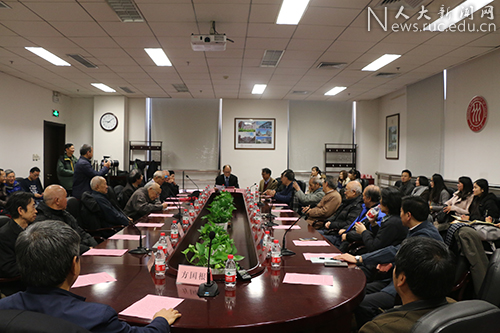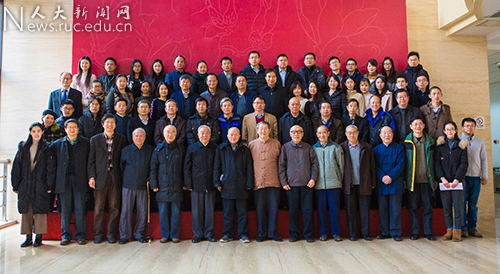“Transformations and Innovations in Chinese Philosophy and Professor SHI Jun’s 100th Birthday Commemoration Academic Seminar” Held at RUC
2017.01.02
On the 24th of December, the “Transformations and Innovations in Chinese Philosophy and Professor SHI Jun’s 100th Birthday Commemoration Academic Seminar” was convened, sponsored by the RUC School of Philosophy. Professor SHI (1916 – 1999) is famous for his contribution to the fields of history of philosophy, Buddhist studies, and education in modern China; completing his studies at Peking University in 1938 he accepted a teaching position there upon graduation, and in 1955 he moved to RUC in order to establish the RUC School of Philosophy. He previously held the positions of Vice President of the Chinese Society for the History of Philosophy and President of the Chinese Society of Modern History of Philosophy Studies, and in 1981 was approved as the first scholar able to supervise PhD students in the specialist field of history of philosophy.
 The seminar revolved around two main themes, the first was “reminiscing the academic achievements of professor SHI,” and the second was “an inquiry into the transformations and innovations in contemporary Chinese philosophy.” Over 50 renowned academics from universities such as RUC, Peking University, Beijing Normal University, the Chinese Academy of Social Sciences, and the Central Party School attended the seminar. The seminar was presided over by RUC School of Philosophy Deputy Dean LUO Anxian.
The scholars and academics present shared their cherished memories of Professor SHI, holding in high regard his scholarly achievements, personal qualities, and his profound contributions. Dean of RUC’s School of Philosophy YAO Xinzhong noted that Professor SHI was the founder of Philosophy Studies at RUC, and had made an enormous contribution to the study of Chinese philosophy since the founding of the People’s Republic. His profound knowledge, noble character, and masterly demeanour caused people to hold him in high regard, and the rich legacy that he left behind has left much for us to earnestly study and carry forward. On the occasion, many other of his former contemporaries and students took the opportunity to pay their respects, and to share with the audience their reminiscences on his legacy.
The other topic of the seminar was that of “an inquiry into transformations and innovations in contemporary Chinese philosophy,” which inspired much deliberation and debate among the academics and scholars who attended the seminar.
The seminar revolved around two main themes, the first was “reminiscing the academic achievements of professor SHI,” and the second was “an inquiry into the transformations and innovations in contemporary Chinese philosophy.” Over 50 renowned academics from universities such as RUC, Peking University, Beijing Normal University, the Chinese Academy of Social Sciences, and the Central Party School attended the seminar. The seminar was presided over by RUC School of Philosophy Deputy Dean LUO Anxian.
The scholars and academics present shared their cherished memories of Professor SHI, holding in high regard his scholarly achievements, personal qualities, and his profound contributions. Dean of RUC’s School of Philosophy YAO Xinzhong noted that Professor SHI was the founder of Philosophy Studies at RUC, and had made an enormous contribution to the study of Chinese philosophy since the founding of the People’s Republic. His profound knowledge, noble character, and masterly demeanour caused people to hold him in high regard, and the rich legacy that he left behind has left much for us to earnestly study and carry forward. On the occasion, many other of his former contemporaries and students took the opportunity to pay their respects, and to share with the audience their reminiscences on his legacy.
The other topic of the seminar was that of “an inquiry into transformations and innovations in contemporary Chinese philosophy,” which inspired much deliberation and debate among the academics and scholars who attended the seminar.

 The seminar revolved around two main themes, the first was “reminiscing the academic achievements of professor SHI,” and the second was “an inquiry into the transformations and innovations in contemporary Chinese philosophy.” Over 50 renowned academics from universities such as RUC, Peking University, Beijing Normal University, the Chinese Academy of Social Sciences, and the Central Party School attended the seminar. The seminar was presided over by RUC School of Philosophy Deputy Dean LUO Anxian.
The scholars and academics present shared their cherished memories of Professor SHI, holding in high regard his scholarly achievements, personal qualities, and his profound contributions. Dean of RUC’s School of Philosophy YAO Xinzhong noted that Professor SHI was the founder of Philosophy Studies at RUC, and had made an enormous contribution to the study of Chinese philosophy since the founding of the People’s Republic. His profound knowledge, noble character, and masterly demeanour caused people to hold him in high regard, and the rich legacy that he left behind has left much for us to earnestly study and carry forward. On the occasion, many other of his former contemporaries and students took the opportunity to pay their respects, and to share with the audience their reminiscences on his legacy.
The other topic of the seminar was that of “an inquiry into transformations and innovations in contemporary Chinese philosophy,” which inspired much deliberation and debate among the academics and scholars who attended the seminar.
The seminar revolved around two main themes, the first was “reminiscing the academic achievements of professor SHI,” and the second was “an inquiry into the transformations and innovations in contemporary Chinese philosophy.” Over 50 renowned academics from universities such as RUC, Peking University, Beijing Normal University, the Chinese Academy of Social Sciences, and the Central Party School attended the seminar. The seminar was presided over by RUC School of Philosophy Deputy Dean LUO Anxian.
The scholars and academics present shared their cherished memories of Professor SHI, holding in high regard his scholarly achievements, personal qualities, and his profound contributions. Dean of RUC’s School of Philosophy YAO Xinzhong noted that Professor SHI was the founder of Philosophy Studies at RUC, and had made an enormous contribution to the study of Chinese philosophy since the founding of the People’s Republic. His profound knowledge, noble character, and masterly demeanour caused people to hold him in high regard, and the rich legacy that he left behind has left much for us to earnestly study and carry forward. On the occasion, many other of his former contemporaries and students took the opportunity to pay their respects, and to share with the audience their reminiscences on his legacy.
The other topic of the seminar was that of “an inquiry into transformations and innovations in contemporary Chinese philosophy,” which inspired much deliberation and debate among the academics and scholars who attended the seminar.



